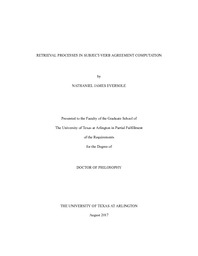| dc.description.abstract | An important question in psycholinguistics is how subject-verb agreement is computed. One recent proposal is that memory retrieval processes play a key role in subject-verb agreement during sentence comprehension (Wagers et al., 2009). This model holds that when an agreeing verb (e.g., praise-s/-∅; was/were) is encountered, a search is initiated through the memory representation of the sentence for a noun phrase (NP) with matching agreement features. When a controlling subject with matching features is available, the search ends successfully. However, in instances of a mismatch with this subject, the mechanism may (incorrectly) satisfy the agreement requirements of the verb with a grammatically inaccessible NP. This dissertation details several self-paced reading and eye-tracking experiments investigating the factors involved in triggering and modulating these retrieval processes. More specifically, these experiments examine the verbal cues that initiate retrieval-based agreement operations as well as their time course and the grammatical cues that might influence these processes.
One finding that has been taken to support the memory retrieval model is the "illusion of grammaticality" in sentences like, *The musicians that the reviewer praise so highly won a prestigious award. Under this proposal, this illusion occurs because the plural relative clause (RC) head (musicians) is able to satisfy the agreement requirements of the RC verb (praise). This study looks into the cues that initiate retrieval processes in three self-paced reading experiments examining whether long-distance agreement attraction is observed across verbal agreement targets. The results of these experiments indicate that long-distance attraction effects occur regardless of the form of the agreeing verb, suggesting that this effect reflects core properties of subject-verb agreement processing. Second, this study uses eye tracking to investigate the time course of long-distance agreement attraction in order to determine whether the attractor element influences early agreement processing or late processing, after ungrammaticality has been indexed. The results of this experiment show that these attraction effects are evident across first-pass reading measures, indicating that these effects relate to the earliest stages of subject-verb agreement processing. Finally, this dissertation examines the extent to which agreement attraction is influenced by structural cues -- specifically, whether the structural position of the attractor NP, either as a syntactic subject or object, affects its viability as a controller for the verb. The results indicate that agreement attraction effects are sensitive to structural information on the attractor noun. Specifically, they appear to show that the agreement processor ignores the features of an attractor noun which has already been encoded as the subject for a verb in a previous clause. | |

